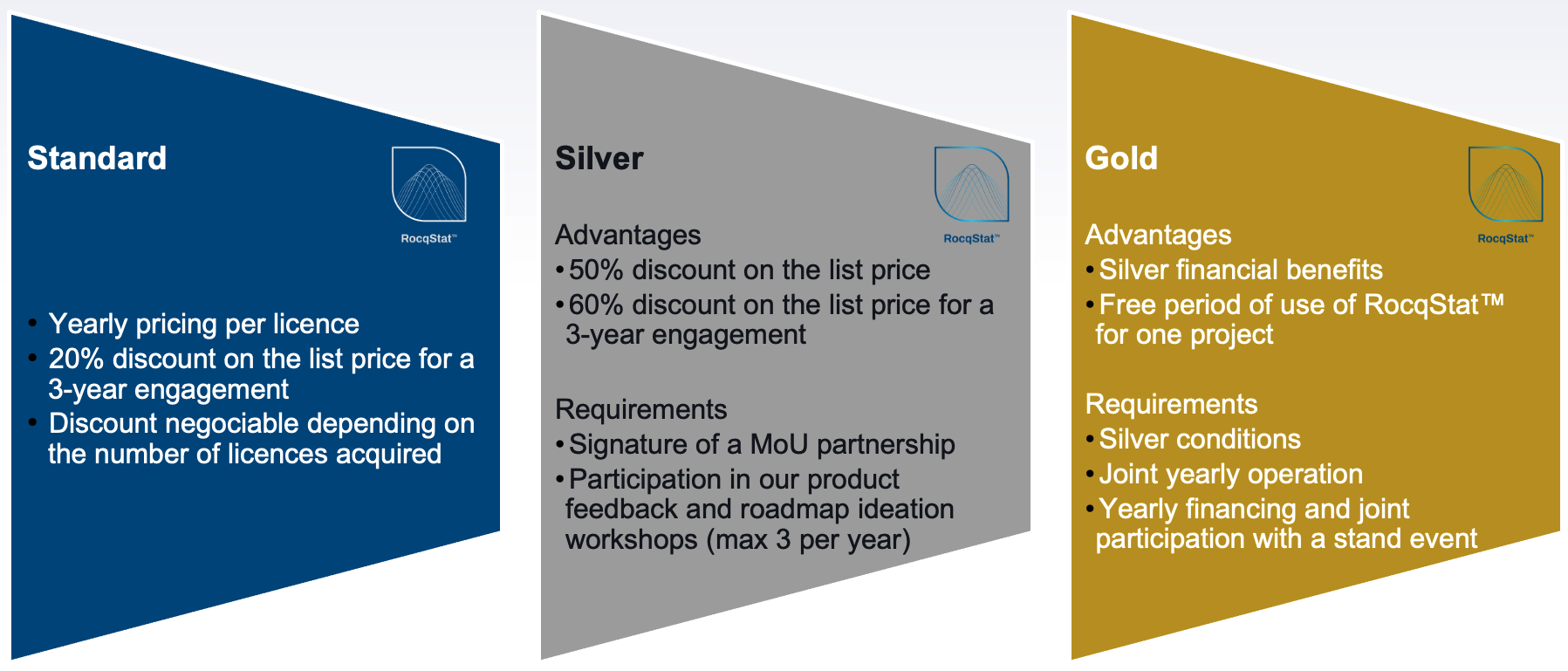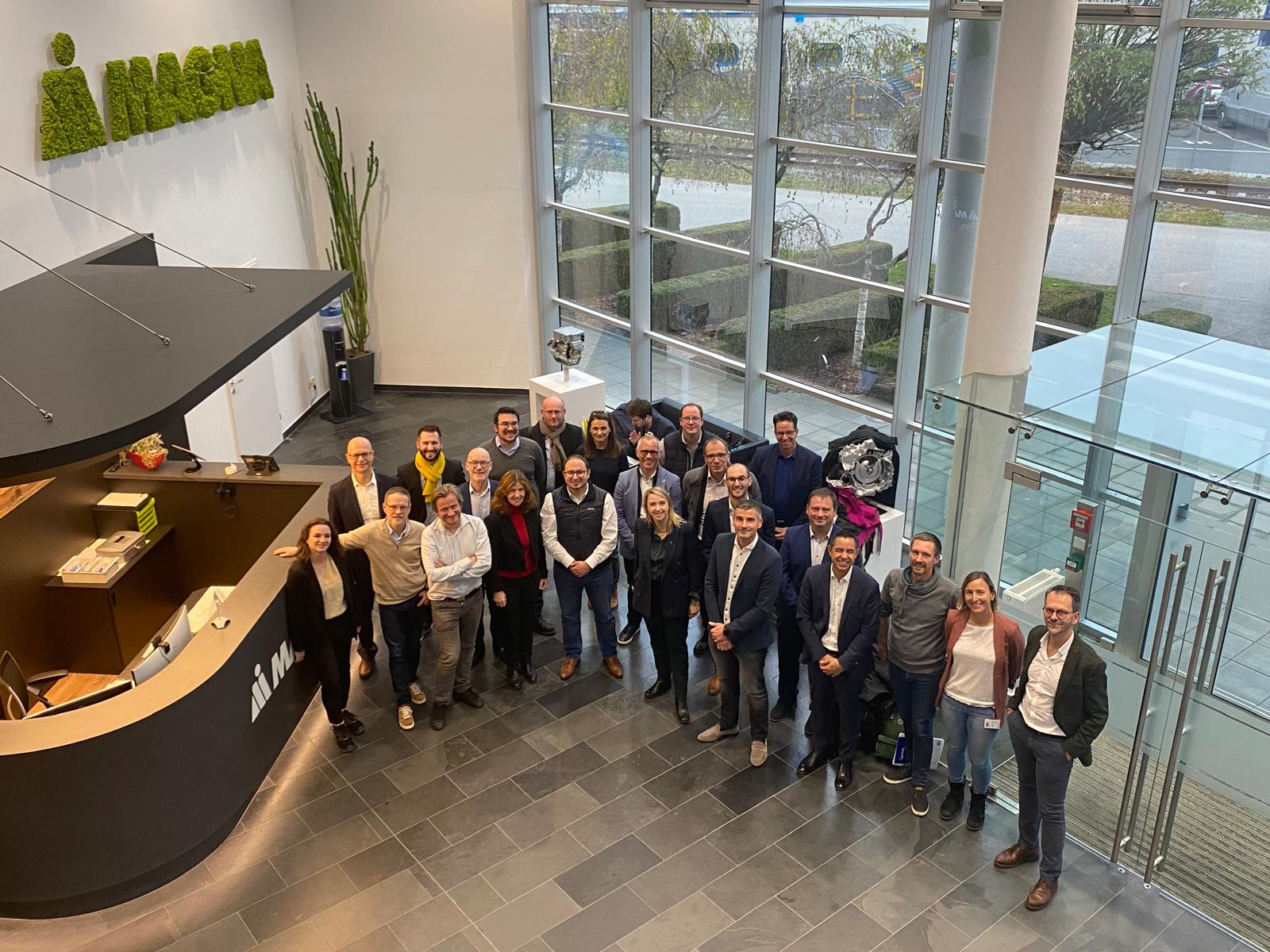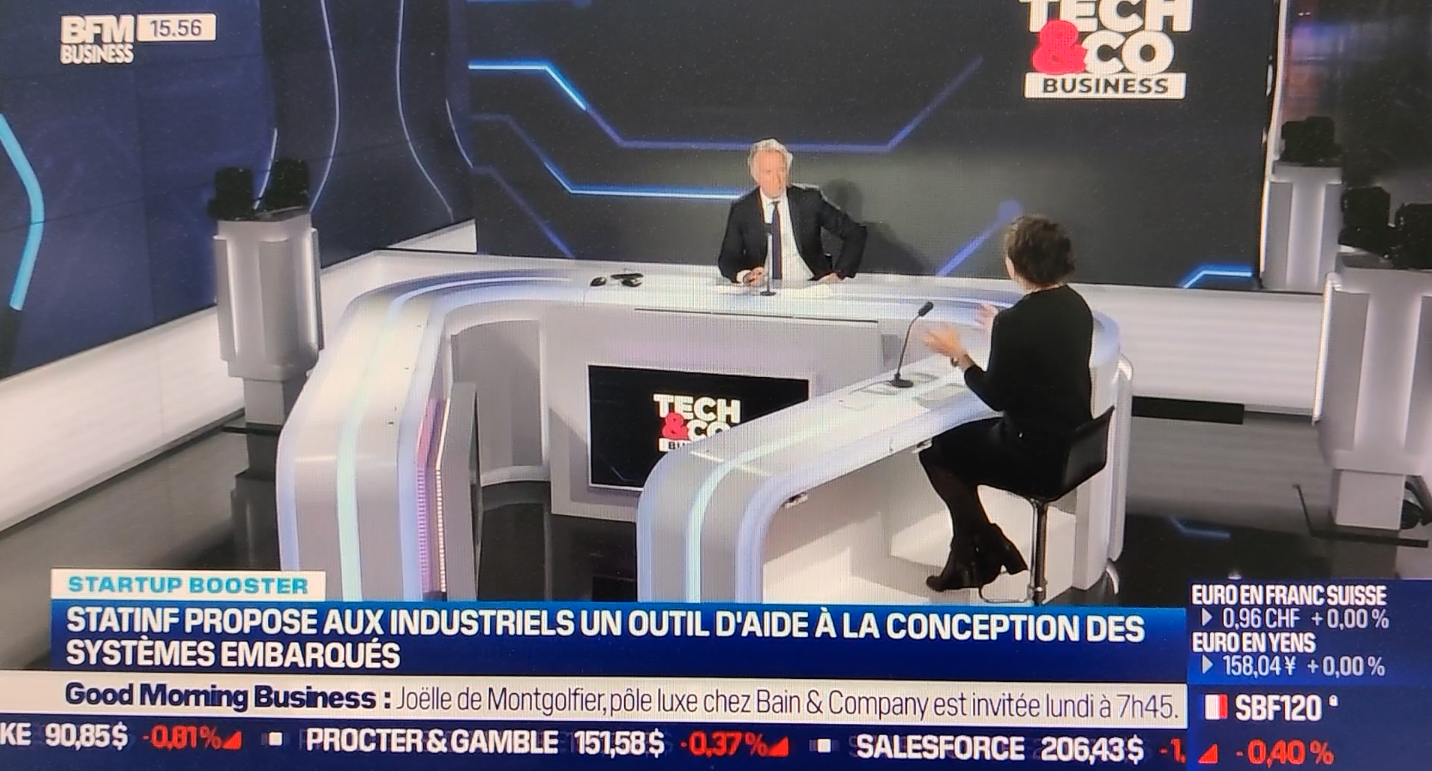Patented Statistics: Building Safe & Efficient Embedded Software
Statistical timing analysis tool helping designers of embedded systems to optimize the use of the hardware by the software
About Us
StatInf, spin-off Inria, proposing an innovative technology
The StatInf "project" officially started within Inria Paris in 2018 as a response to industrial partners asking for a commercial version of the timing-analysis prototype created after years of research, by the two co-founders, Dr. Adriana Gogonel and Dr. Liliana Cucu-Grosjean.
Now, StatInf is a company specialized in cutting-edge software solutions for the performance and certification of real-time embedded systems. Our flagship product, RocqStat, leverages advanced statistical methods to optimize the timing predictability, safety, and energy efficiency of embedded complex architectures. By enhancing software performance in mission-critical applications, StatInf empowers embedded-system designers with the next-generation tools needed to meet growing computational demands while ensuring safety and efficiency.


Applications
 |
 |
 |
AerospaceThe time-oriented StatInf’s product, RocqStat, is dedicated, primarily, to the analysis of software that requires a validation of the time budget needed for safe execution on microprocessors. The market for RocqStat, is that of Embedded Systems, such as avionics, space, automotive, autonomous vehicle, industrial or medical robots. |
AutomotiveAutomotive, as well as avionics and railways standards wrt time budget put strict constraints on the embedded system designers in these areas. Depending on the complexity of the programs and the processors used, these constraints are more or less difficult to respect. This is the reason why multicore microprocessors are still not used in these areas. |
Autonomous vehicleExpert in safe non-functional design, StatInf worked on the provability of statistical approaches to validate the use of complex processors by observing in a non-intrusive way the behavior of programs implementing critical functions, from sensors to actuators. |
Products & Services
StatInf proposes to its customers a time-oriented product, RocqStat.
RocqStat stems from the industry’s interest in accelerating the analyses of software by using statistical and probabilistic methods as a means to decrease the complexity. StatInf builds its technology on top of a common understanding derived from the state-of-the-art academic literature.
Timing reliabilityProvable statistical methods produce reliable WCET on complete software execution |
Predictive statisticsPredictive statistics using dynamic tracing combined with static binary code analysis |
Code CoverageCode Coverage conducted using a mix of static and statistic traces |
Improvement testingsStop criterion to validate time budget before and after code modification |
Unexpected software behavior trackingPredictive statistics using dynamic tracing combined with static binary code analysis |
Multicore supportMulticore perturbation on global program execution |
Ecosystem & network
Following its values, StatInf supports and contributes to several Research and/or Industrial French and European Associations. StatInf is member of the Systematic competitivity pole, of the Embedded France Association, French Tech, ASTech and France Innovation. StatInf is also member of more specific associations as Aerospace Valley, the aerospace French community or EARPA, the European Research Association in Automotive. StatInf is a former alumni of ESA-BIC Nord, the ESA accelerator as well as STARBURST, Wilco Industry and Agoranov alumni.
StatInf received significant support from BPI, facilitating further Research and Development, making BPI a partner of StatInf.
Partnerships
StatInf is a spin-off of Inria, the state-run laboratory for Computer Science Research. As such they are StatInf’s privileged partner. An agreement between the two entities gives StatInf exploitation exclusivity of two Inria patents co-written by StatInf’s co-founders. This collaboration is strengthened through PhD thesis co-supervised by the two entities. CIFRE PhD grants were obtained from ANRT for advancing on common research topics of Inria and StatInf.
StatInf is partner through collaborative projects with important French and European actors in automotive.
The consortium Mach2 , of six major mobility players – Alstom, EasyMile, Equans, Keolis, Renault Group and StatInf – is preparing the launch of a new, low-carbon public transport service at Level 4 (without an on-board supervisor) of autonomous driving. brings together French leaders in mobility, each contributing its own area of expertise: Renault Group for the robotized electric minibus platform, EasyMile for the autonomous driving system, StatInf for the validation of critical software elements, Equans for the Operating Assistance and Traveler Information system, Alstom for the connected safety infrastructure and communication protocols, and Keolis for the operation and maintenance of these new public transport services.
The HAL4SDV project puts together more than 50 partners in the European automotive industry. The project’s mission is to advance European solutions in software-defined next-generation vehicles. By focusing on unifying software interfaces and development methodologies, HAL4SDV will enable software configuration that abstracts from vehicle hardware, paving the way for a "software-defined vehicle (SDV)" approach for both safety-critical and non-safety-critical applications in future vehicles.
StatInf is partner with Lauterbach, European provider of debug and trace tools. This joint endeavor provides users with the ability to use program flow trace captured by Lauterbach’s TRACE32® trace tools with the RocqStat™ analysis tools from StatInf.
StatInf is partner with SYSGO, European provider of real-time operating systems for critical embedded applications in the Internet of Things (IoT). StatInf’s products have been designed to meet the highest requirements when it comes to Safety and Security. Our customers are leading players in the Aerospace, Railway, Automotive, Medical and Industrial Automation industries, who use our PikeOS product as a platform for critical systems that need to be certified against industry-specific Safety and Security standards.
Call for partnerships
We’re actively building a community of forward-thinking partners. Whether you're an innovator in embedded systems or an organization looking to stay ahead of technological challenges, a partnership with StatInf offers unmatched value:
Exclusive Feedback Opportunities: influence the evolution of RocqStat™ through a virtuous feedback loop, prioritizing features that meet your specific needs.
Preferred Access: Gain discounted licenses and early access to our cutting-edge technologies in return for contributing to our product development journey.
More information about the StatInf's partnerships offer HERE.
 |  |  |  |
 |  |  |  |
 |  |  |  |
 |  |  |  |
 |  |  |  |
Clients and partners testimonials

Airbus Toulouse, Avionics Software
"Program flow trace, e.g. NEXUS BTM, is essential to establish the coverage of your measurements. If non intrusive and timestamp accurate, the BTM (and other traces if available) can feed WCET Static Analysis methods, or help build hardware timing models, or feed statistical methods to check the quality and exhaustivity of the collected durations. And ultimately to justify safe upper bounds for the WCET. Traces are a rich source of information for WCET analysis."

Lauterbach, Germany
"Lauterbach, the World’s leading provider of debug and trace tools is pleased to announce a co-operation with StatInf. This joint endeavor provides users with the ability to use program flow trace captured by Lauterbach’s TRACE32® trace tools with the RocqStat™ analysis tools from StatInf."

ESA BIC, France
Communiqué de presse,Mars 2021
"StatInf is a spin-off from Inria created in 2019. It developed an embedded software to help designing embedded systems. By combining methods from the embedded world and statistics, StatInf not only enables new generation of processors usage in total safety in critical domains, but also reduces development cycles, introduces IA in control loop and minimises energy consumption.
StatInf addresses challenges for critical embedded systems designers in industries such as avionics, space domains, automotives and railway."
Our team

Dr. Adriana Gogonel
CEO of the company, has a PhD in statistic from the University Paris-Descartes, followed by a 6-year postdoctoral fellowship at Inria. At the end of the 6 years at Inria raises the idea of creating the company as a necessity to transfer the technology supported by two patents that Adriana and Liliana co-wrote. Adriana and Liliana were supported by Inria in their company creation process with, among other, an 8-month entrepreneurial training at EMLyon for Adriana.

Dr. Liliana Cucu-Grosjean
Scientific advisor of the company, has a PhD in computer science from the University of Paris-Saclay and an accreditation to supervise sustained research at Sorbonne University. Her work focuses on the use of statistical and probabilistic approaches for the design of cyber-physical systems. Author of more than 60 articles and several patents, she has carried out numerous national and European collaborative projects for Inria. She supervised 8 PhD thesis and 9 post doctoral students.

Dr. Slim Ben Amor
Slim joined StatInf, as an R&D engineer, in November 2020 after his PhD. Slim carried out his doctoral thesis work at Sorbonne University in collaboration with Inria under the supervision of Liliana Cucu-Grosjean. His thesis topic “Scheduling of Dependent Tasks with Probabilistic Runtime on Multicore Processors” is of interest to StatInf’s technology direction.

Kossivi Kougblenou
Kossivi is an embedded systems research engineer having a Master2 from the University of Paris Saclay on embedded systems specialization. Kossivi joined the team in April 2020 for his internship and continued as an engineer starting October 2020.

Ismail Hawila
Ismail is a research engineer doing his PhD thesis under the supervision of Liliana Cucu-Grosjean. The topic of Ismail thesis is “The multicore scheduling of real-time systems for the control and monitoring of probabilistic tasks with precedence constraints” and he is co-supervised on StatInf’s side by Slim BEN AMOR. He joined StatInf in October 2022.

Dr. Hadrien Clarke
A graduate in Engineering, Hadrien starts his professional career in Japan at a Research Institute. He is then awarded a PhD degree in Advanced Information Technologies from Kyushu University. He later moves to the United States to work as a Senior Software Engineer in embedded systems for a major aerospace company. Back in France and after joining the Kopernic team at Inria for a while, Hadrien is today Statinf’s Chief Software Architect. He joined StatInf in May 2022.

Issao Ueda
Issao oversees our product development and operational growth as our CPO. He graduated from Telecom SudParis and holds a Master’s degree in International Sales Management from the Institut Mines-Télécom Business School. After 9 years in IT presales where he became bid manager, he created his own structure, specialized in business and operational management for Blockchain projects. Issao joined StatInf in November 2022.

Dr. Jordy Ruiz
Jordy is a research engineer with experience in static analysis for low-level systems and timing analyses. He defended his PhD in Toulouse, on the topic of “Determination of data flow properties to improve worst-case running time estimates” then he worked as an academic for Université Lille and Imperial College London. Jordy joined Statinf in October 2022 as a research engineer.

Dr. Benjamin Rouxel
Benjamin joined StatInf for the position of R&D Chief Officer. He is currently finishing his Post-Doc at Unimore in the Hipert Lab after two years at the University of Amsterdam PCS group. In December 2018, he finished his PhD on Minimising communication costs impact when scheduling real-time applications on multi-core architectures at University of Rennes 1 under the supervision of Prof. Isabelle Puaut and Steven Derrien. During his PhD time, he was part of the groups PACAP and CAIRN at INRIA/Irisa.
Alumnis
Rihab Bennour | Marwan Wehaiba El Khazen |
Join Us
We are an ambitious team aiming to revolutionize the world of embedded systems. Your work will help make safer cars, planes and spacecrafts!
StatInf’s challenge is to produce timing verification solutions for computer programs in order to improve the safety and security of critical systems.
In the past, vehicle design consisted of defining specific functions that an equipment manufacturer was responsible for carrying out in black box mode. Today a new dynamic is underway, software functions are designed to be compatible and scalable for the hardware architectures of today and tomorrow, adding pressure on respecting temporal constraints.
With programs becoming more and more complex and running on increasingly powerful processors, this challenge is increasingly relevant.
If you think you have the skills required to strengthen our team and take on major challenges, then do not hesitate to contact us!
News
StatInf: Shaping the Future of Embedded Systems!
At StatInf, we are revolutionizing the way embedded systems are designed and optimized for critical industries such as aerospace, automotive, defense, and beyond. Our flagship product, RocqSt[...]
StatInf rejoint le programme d’accélération à l’international France 2030 Export
En tant qu'entreprise labellisée France Relance 2030, StatInf est fière d’annoncer qu&[...]
Contact

- contact@statinf.fr

- +33 1 84 19 26 60

- 102-104, Rue Gabriel Péri, 94250 Gentilly, France
- Registered in the Nanterre Trade and Companies Register under number 879 473 593
 StatInf
StatInf



